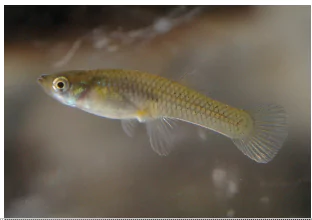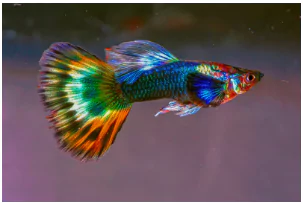The National Green Tribunal (NGT) has sought a response from the Centre regarding the use of two highly-invasive and alien fish species for mosquito control.
- The tribunal was hearing a plea regarding the release of Gambusia Affinis (Mosquitofish) and Poecilia Reticulata (Guppy) in water bodies across various states.
About Gambusia Affinis (Western Mosquitofish)

- Common Name : Mosquitofish.
- Purpose : Used as a biological agent to control mosquito larvae.
- Native Range: Mississippi River basin from Central Indiana and Illinois to the Gulf of Mexico .
- Mosquito Control: A single adult fish consumes 100 to 300 mosquito larvae per day.
- Characteristics:
- Habitat: Found in freshwater; tolerates brackish water and high salinities.
- Adaptability : Survives in low oxygen levels.
- Reproduction : Breeds throughout summer and are Viviparous , that is they give birth to live young instead of laying eggs.
- Invasiveness: Listed among the 100 worst invasive alien species by IUCN.
- Historical Use in India: Introduced in 1928 during British rule for mosquito control.
- IUCN Status: Least Concern.
Enroll now for UPSC Online Classes
About Poecilia Reticulata Common names: Guppy, Millionfish or Rainbow Fish

- Range: Native to Northern South America and Caribbean islands.
- Habitat: Found in shallow edges of pools and streams.
- Usage: Also used for mosquito larvae control.
- IUCN Status: Least Concern.
States Involved in Fish Release
- Mosquitofish was released in Assam, Arunachal Pradesh, Gujarat, Karnataka, Maharashtra, Rajasthan, Tamil Nadu, Uttar Pradesh, Odisha, Punjab, and Andhra Pradesh.
What is an Invasive Species?
- Invasive species are non-native organisms that spread rapidly and harm local ecosystems.
- They often outcompete indigenous species, disrupt ecosystems, and cause economic or environmental damage.
Examples of Invasive Species in India
- Flora: Lantana camara, Parthenium hysterophorus (Congress grass), Prosopis juliflora (Vilayati Kikar).
- Fauna: African Catfish (Clarias gariepinus), Tilapia (Oreochromis mossambicus), and Giant African Snail.
|
- Guppy was released in Maharashtra, Karnataka, Punjab, and Odisha.
- Concern: Their widespread distribution poses risks to local biodiversity.
Check Out UPSC NCERT Textbooks From PW Store
Ecological Impact
- Threat to Native Fish : Competes for food and habitat, causing food scarcity for indigenous fish.
- Biodiversity Loss : Can lead to a decline or extinction of native species.
- Ecosystem Disruption: Alterations in food chains affect entire aquatic ecosystems.
Ready to boost your UPSC 2025 preparation? Join PW’s UPSC online courses today!
To get PDF version, Please click on "Print PDF" button.



